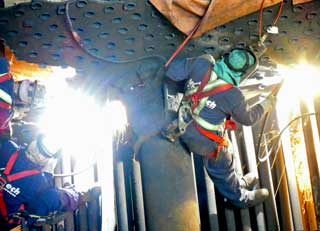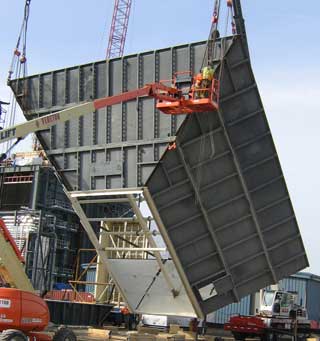What does a Boilermaker do?
The name of our trade will make you think we make and repair boilers and, in some cases, we do just that. But working on boilers is only a small part of what a modern Boilermaker does.

Boilermakers build, repair and maintain huge and complex industrial installations, including plants, refineries and storage facilities.

Boilermaker-welders fit parts together using arc-welding equipment.
Today’s Boilermakers build and maintain the tanks and pressure vessels that are at the heart of huge installations, such as hydro, nuclear and other energy facilities (including oil-sands plants), chemical, cement, glass and steel plants. The pressure vessels we work on could be boilers, tanks, heat exchangers, fired heaters or reactors. They could include the lines that transmit gasses and chemicals, often under pressure, throughout a facility such as a refinery or liquid natural gas plant.
Boilermakers not only make, but move huge part assemblies into position at the installations where they work. These Boilermakers are called fitters and riggers.
Boilermakers also work in metal fabrication and are critical to the operation of fertilizer, potash and water-treatment plants, breweries and to the shipbuilding industry in B.C.
Our modern economy cannot do without the skills of the people who work in our trade.

Boilermaker-riggers supervise the installation of the large-scale components that form the huge industrial installations they build and maintain.
What does the work involve?
- Developing a layout and planning the sequence of work to be done
- Laying out plate, sheet steel or other heavy metal, and locating and marking bending and cutting lines
- Shaping the metal using metalworking machines such as shears and drill presses
- Cutting metal plate and brackets using an oxy-fuel torch, and chiping and grinding parts to shape for fitting together
- fitting and tack welding parts together using electric arc welding equipment
Types of Boilermakers
In addition, Boilermakers can be riggers, working with crane operators to position huge components such as tanks exactly where they are needed.
Construction Boilermakers work onsite to erect, install, maintain and repair the components described above, often working on scaffolds.
Shop Boilermakers work in a manufacturing or repair facility to lay out, fit and weld components of boilers, tanks and pressure vessels, performing all types of structural and plate work.
Marine Boilermakers build and repair ships that are in service throughout the world. They can work for a private company or for the federal government, building, maintaining and repairing the ships of the Canadian Navy.
Cement, Lime and Gypsum Boilermakers work in cement, lime, gypsum plants and in quarries. These Boilermakers will operate the plants and heavy equipment. These members may be qualified millwrights, machinists, electricians, welders or towboat captains or crews.
Carbon Capture
One of the best ways of reducing our carbon footprint is through carbon capture and Canada’s Boilermakers are world leaders in building the facilities. Carbon capture can reduce the carbon emissions of a coal-fired electrical plant by 90%. Shell’s Quest carbon capture facility in northern Alberta removes a million tonnes of carbon per year from the atmosphere. And the groundbreaking Sturgeon Refinery will produce clean diesel fuel while using captured carbon from a number of industrial facilities to enhance the productivity of oil fields.
As carbon capture becomes more efficient and less expensive to build, this technology has the potential to be a real game changer in the fight to reduce carbon emissions.
Non-Destructive Testing
Non-destructive testing (NDT) is a very specialized type of work that plays a critical function within the construction and manufacturing industries in Canada. The industry employs highly specialized technicians who use sophisticated equipment and techniques to evaluate areas that are difficult or impossible to examine using the naked eye.
These technicians inspect boilers and pressure vessels, fabrication & joining processes and evaluate the integrity of welded structures in new repairs to ensure a safe and efficient operation in compliance with stringent government codes and strict industry standards.
Visit QCC Canada to learn more about these members.
